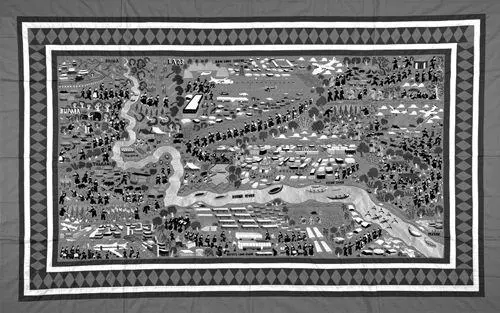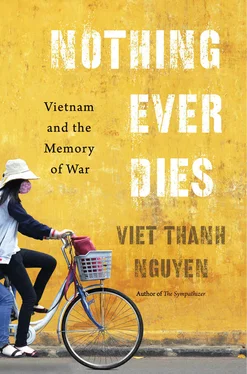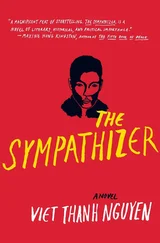
As I have argued throughout this book, just memory proceeds from three things. First, an ethical awareness of our simultaneous humanity and inhumanity, which leads to a more complex understanding of our identity, of what it means to be human and to be complicit in the deeds that our side, our kin, and even we ourselves commit. Second, equal access to the industries of memory, both within countries and among countries, which will not be possible without a radical transformation, even a revolution, in the distribution of wealth and power. And third, the ability to imagine a world where no one will be exiled from what we think of as the near and the dear to those distant realms of the far and the feared. I have foregrounded an imagination that thinks and sees beyond the nation because the nation dominates how we carry out our struggles over culture and race, over economy and territory, over power and religion. As the poet Derek Walcott says of the stakes involved—“Either I’m nobody, or I’m a nation.” 8The nation seduces us, particularly if we happen to be cast out of it as refugees, a population that now numbers at least sixty million, a floating, global archipelago of human dispossession. 9But as powerful as Walcott’s line is, I prefer another, more hopeful line by him from the same poem: “I had no nation now but the imagination.” 10Here the poet rejects the fiction that the only alternative to the nation is one’s negation and corrects cosmopolitanism’s idea of a citizen of the world. Since such a stance might overlook the citizen’s other, the refugee forced to flee, the artist turns from claiming the world or a nation to claiming the imagination. In this act, we have one way toward both just memory and just forgetting.
This kind of forgetting is rare and much more difficult to accomplish than the kind of unjust forgetting occasioned by accident, time, amnesia, or death, which are normal and require no effort. The sign of unjust forgetting is repetition. If we repeat a history of violence, then we have not addressed the root causes of that violence. Hence our current predicament in America: we are caught in a time warp of perpetual violence. America’s wars have seemed to go on forever, at least for Americans, who live eternally in the present. That is why the journalist Dexter Filkins, in writing of the wars in the Middle East, collectively calls them “The Forever War” in his book of the same title. He borrowed it from the novelist Joe Haldeman, who wrote the science fiction classic The Forever War . Haldeman was an American combat veteran of my war who dealt with its absurdity by writing a science fiction allegory. In his fictional war, Earth’s best and brightest are drafted to battle bug-like aliens on foreign planets. The military desensitizes the soldiers to killing and programs them to hate and destroy the aliens in a war that turns out to have occurred from miscommunication. Traveling by spaceship and subject to the laws of relativity, the soldiers return to Earth to discover that while they have aged only months, Earth has aged decades. Unable to readjust, the soldiers volunteer for more missions, knowing they will return only after their relatives are dead. For the soldiers, war goes on forever. War also goes on forever for the civilians on the home front, desensitized as they are to the perpetual war that is part of their everyday routine. Theirs is an eternity, but not one of the divine kind.
This is science fiction, but it is also the present, a time when humans live intimately with their inhumanity, accepting it to be normal and eternal. Fiction, and storytelling and art in general, is one way to show us the absurdity of this normality. If the first time we fight a war is tragedy, and the second time a farce, then what do we call the third time, much less the fourth time and the fifth, ad nauseam? Perpetual war, eternal war, Forever War, in which my war was only an episode, an interruption, an aberration in the chronology that America sees for itself.
That chronology centralizes the triumph of the American way of life, marked by the conflation of democracy and freedom with capitalism and the profit motive. This is a timeline in which democracy is unimaginable without capitalism, and vice versa. A deep investment in this timeline compels many Americans who visit my country of origin to resort to a comforting story about progress and the inevitability of the American way of life: even though Americans lost the war, capitalism has won in the end. The recurrent motifs in foreign reportage about the country of my birth is that the majority of the people are born after war’s end, have little desire to remember it, and are instead focused on the same materialism that motivates their communist leaders. 11The revolution has died. The dollar has triumphed. Long live capitalism! (The situation is similar in Laos and Cambodia.) Despite all the remembering that occurs in both America and Vietnam, an unjust forgetting is winning. This is the case because Vietnamese official memory is unjust, unable to confront the failure of the revolution in bringing freedom and independence to all of the people. American official memory is unjust, too, for it learns no lessons from my war except the lesson to fight the Forever War more efficiently. 12The reconciliation between Vietnam and America, so far as it has happened, is the reconciliation of two forms of unjust memory and unjust forgetting.
If the precondition for just forgetting is just memory, perhaps it is an impossible forgetting. When, exactly, will we have a time of ethical awareness of our inhumanity, where the industries of memory are available to all, where the artistic will to claim the imagination is norm rather than exception? This is utopian. Yet, at one point, the human imagination had difficulty thinking beyond the light cast by the fire, then of the distance that the tribe could walk, then the walls of the city-state. So why can we not imagine a future where nations at war seem absurd? Novelist Doris Lessing puts it this way:
I’ve lived through Hitler, ranting and raving; Mussolini too; the Soviet Union, which we thought would last for all time; the British Empire, which seemed impregnable; the color bar in Rhodesia and elsewhere; the heyday of European empires. It was inconceivable to think these would disappear. They seemed permanent. Now not one of them remains — and I think that is a recipe for optimism. 13
The impossible might yet be possible at some point in the future, which is again where art, among other agents, plays a guiding role. Sometimes art does so by imagining utopia, or, through negative lessons, dystopia. Sometimes it does so by offering us models for how to be more human or more ethical in our behavior to one another, or by demanding that we see how inhuman and unethical we can be. And sometimes art, simply by being art, by calling us into a relationship with it, is the template for reflective, contemplative, meditative thinking and feeling that might allow us to become citizens of the imagination. This is an individual, mysterious realm where art and imagination offer some hope and salve to the harsh histories of war, violence, bloodshed, hatred, and terror that continue to affect us. But while art can provoke an ethical awareness of our inhumanity that is necessary for just memory, it cannot achieve just memory alone, not while the industries of memory remain unequal.
Still, art’s potential for the individual points toward one way that solace can be achieved during times of unjust memory and unjust forgetting, during our times today. That solace is also found in forgiveness of the most genuine kind, what the philosopher Jacques Derrida called “pure” forgiveness, an “exceptional” and “extraordinary” forgiveness. 14For Derrida, pure forgiveness is distinct from the kinds of forgiveness tainted by political, legal, or economic considerations, found in acts of amnesty, excuse, regret, reparation, apology, therapy, and so on. 15Pure forgiveness arises from the paradox of forgiving the unforgivable. All other forms of forgiveness are conditional — I will forgive, if you give me something. The act of forgiving is compromised, as it is between Vietnam and America. Vietnam will forgive America, so long as America invests in it and offers protection against China. America will forgive Vietnam, so long as Vietnam allows itself to be invested in and permits the use of its territory — land, sea, or air — for America’s fight against China. Americans who return to Vietnam and feel wonderstruck by how the Vietnamese seem to forgive them do not understand that such forgiveness is conditional. While the Vietnamese surely extend some generosity of spirit to Americans, an undertone of profit exists, for Americans are walking wallets. Such forgiveness is also made possible by the deeper animosity the Vietnamese at home hold against the Vietnamese overseas, whose returns to the homeland can be ambivalent or even fraught. And the reconciliation between the Vietnamese and their French or American invaders must be measured against the hostility the Vietnamese hold against the Chinese. The Vietnamese and the Chinese have their own version of the Forever War, which began when China colonized Vietnam for a thousand years. Neither the Chinese nor the Vietnamese have forgotten that history of conflict, which is why they still repeat it.
Читать дальше













